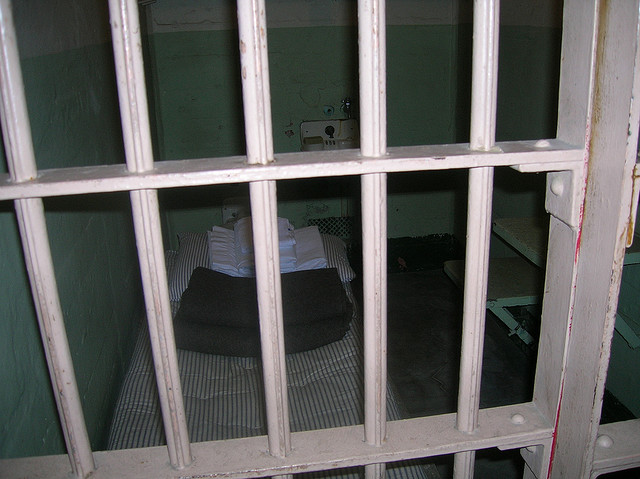By Lexie Schapitl
Capital News Service

Prison bars by Ken Mayer under a Flickr Creative Commons license
UPDATED 3/23 12:30 p.m. Legislation that aims to reduce Maryland’s prison populations, corrections spending and recidivism rates got preliminary approval from the state Senate Wednesday, after concerns were raised Monday over committee amendments to the bill.
The Justice Reinvestment Act would alter criminal penalties and provisions on sentencing, corrections, parole and supervision in an effort to focus correctional resources on “serious and violent offenders,” according to a legislative analysis.
Provisions of the bill would limit punishments for technical violations of parole and alter maximum penalties for some drug offenses. The bill also establishes an administrative parole process for nonviolent offenders who have served one fourth of their sentences and meet certain requirements.
The effort comes as President Barack Obama and other politicians have worked to move away from the harsh criminal sentencing practices of the war on drugs.
In Maryland, enforcement-centered policing practices received attention after the death of Freddie Gray last April and the resulting unrest in the city.
Committee makes changes
The Senate Judicial Proceedings Committee on Thursday made changes to the bill that allow for more judges’ discretion in granting parole and sentencing parole violators, to protect public safety, said committee Chair Sen. Bobby Zirkin, D-Baltimore County.
For example, second degree assault is not considered a crime of violence in this state, but an offender convicted of second degree assault who violates his probation may be a danger to others around him, Zirkin said.
Under the original bill, offenders who commit technical parole violations could be sentenced to no more than 15 days for a first-time offense, no more than 30 days for a second offense and no more than 45 days for a third offense.
Tying judges’ hands and providing no public safety exceptions to these provisions is “simply irresponsible,” Zirkin said.
“Unfortunately there are some who, in the name of saving money, would put citizens at risk,” Zirkin said. “I’m not going to let some violent criminal back out on the street just so we can save a couple dollars.”
Reduced savings
The amendments would drastically reduce the fiscal impact of the bill, reducing savings to Maryland taxpayers from $247 million over the next 10 years to $34 million over the same time span, according to one analysis. Committee members dispute that lower figure.
The prison population would grow slightly as a result of the amended bill; the original bill would have decreased the population by 14% by 2026, the analysis states.
Zirkin said the amended bill strikes a “middle ground,” serving the spirit of the legislation while still keeping people safe. The bill seeks to treat nonviolent offenders and drug addicts “in a way that makes sense,” and there are ways to save money on criminal justice without endangering the public, he said.
ACLU objects
Toni Holness, public policy counsel for the ACLU of Maryland, called the amendment on parole violations an “escape clause” for judges. The ACLU feels strongly that the state should limit the amount of time served for technical violations, such as missing an appointment with a probation officer, she said.
“These are not new offenses,” Holness said. “So it makes little sense to be populating our prisons, wasting taxpayer dollars and disrupting whatever progress defendants are making otherwise just for the sake of being tough on crime.”
The Senate bill would also increase the maximum penalties for second-degree murder and kidnapping from 30 years to 40 years. Holness said this provision “goes against the spirit and the letter” of the act.
“The purpose of the initiative was to reduce incarceration and to reduce spending on incarceration, and increasing the penalties for these offenses does neither of the above,” she said.
Sen. Joanne Benson, D-Prince George’s, requested Monday that the chamber special order the bill until Wednesday so that the Legislative Black Caucus could have time to review it noting the large number of minorities in prison.





Recent Comments